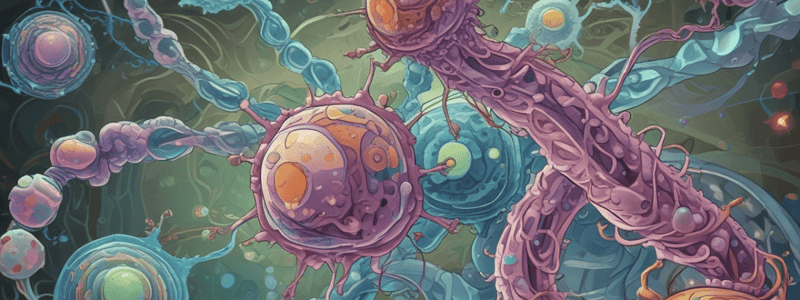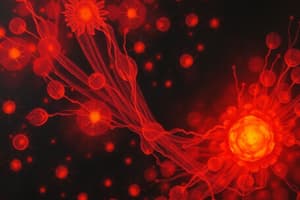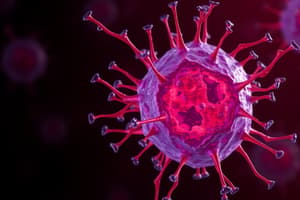Podcast
Questions and Answers
What is the result of IP3 triggering calcium mobilization?
What is the result of IP3 triggering calcium mobilization?
- The activation of nuclear factor of activated T cells (NF-AT) (correct)
- The activation of protein kinase C (PKC)
- The activation of the Ras-mitogen-activated protein kinase (MAPK) pathway
- The activation of transcription factor AP-1
What is the function of Ras guanine nucleotide-releasing protein?
What is the function of Ras guanine nucleotide-releasing protein?
- To activate the Ras-mitogen-activated protein kinase (MAPK) pathway (correct)
- To activate protein kinase C (PKC)
- To activate transcription factor NF κ B
- To activate nuclear factor of activated T cells (NF-AT)
What is the characteristic of T-independent antigens?
What is the characteristic of T-independent antigens?
- They are only found in viruses
- They require T-cell help for activation
- They have a low density of repeating antigenic determinants
- They have a high density of repeating antigenic determinants (correct)
What is the role of B cells in the immune system?
What is the role of B cells in the immune system?
What is the result of the interaction of B-cell receptors with antigen?
What is the result of the interaction of B-cell receptors with antigen?
What is the structure of the antibody molecule depicted in?
What is the structure of the antibody molecule depicted in?
What is the characteristic of antigens that do not have repeating determinants?
What is the characteristic of antigens that do not have repeating determinants?
What is the predominant antibody in the primary immune response?
What is the predominant antibody in the primary immune response?
What is the function of IgA?
What is the function of IgA?
What is the result of class switching within a given B-cell clone?
What is the result of class switching within a given B-cell clone?
What is the effect of immunosuppressants on the immune system?
What is the effect of immunosuppressants on the immune system?
What is the role of eicosanoids in the body?
What is the role of eicosanoids in the body?
What is the action of cyclooxygenase (COX) in the biosynthesis of eicosanoids?
What is the action of cyclooxygenase (COX) in the biosynthesis of eicosanoids?
What is the effect of low-dose aspirin on COX-1?
What is the effect of low-dose aspirin on COX-1?
What is the characteristic of coxibs?
What is the characteristic of coxibs?
What is the function of IgE?
What is the function of IgE?
What is the primary function of prostanoids in the body?
What is the primary function of prostanoids in the body?
What is the main difference between COX-1 and COX-2?
What is the main difference between COX-1 and COX-2?
What is the therapeutic effect of NSAIDs?
What is the therapeutic effect of NSAIDs?
What is the advantage of COX-2 selective drugs over non-selective NSAIDs?
What is the advantage of COX-2 selective drugs over non-selective NSAIDs?
What is the mechanism of action of glucocorticoids?
What is the mechanism of action of glucocorticoids?
What is the primary effect of lipoxygenase pathway activation?
What is the primary effect of lipoxygenase pathway activation?
What is the primary clinical relevance of the lipoxygenase pathway?
What is the primary clinical relevance of the lipoxygenase pathway?
What is the therapeutic effect of COX-2 selective inhibitors?
What is the therapeutic effect of COX-2 selective inhibitors?
What is the risk associated with the use of COX-2 selective inhibitors?
What is the risk associated with the use of COX-2 selective inhibitors?
What is the function of EETs in the body?
What is the function of EETs in the body?
What is the function of EETs in the cardiovascular system and kidney?
What is the function of EETs in the cardiovascular system and kidney?
What is the primary function of the immune system?
What is the primary function of the immune system?
What is the role of phagocytes in the immune response?
What is the role of phagocytes in the immune response?
What is the function of lymphocytes in the immune response?
What is the function of lymphocytes in the immune response?
What is the role of B lymphocytes in the immune response?
What is the role of B lymphocytes in the immune response?
What is the role of T lymphocytes in the immune response?
What is the role of T lymphocytes in the immune response?
What is the function of immunoglobulin G (IgG)?
What is the function of immunoglobulin G (IgG)?
What is the function of immunoglobulin M (IgM)?
What is the function of immunoglobulin M (IgM)?
What is the term for the ability of the immune system to distinguish between self and non-self?
What is the term for the ability of the immune system to distinguish between self and non-self?
What is the term for any substance that can spark an immune response?
What is the term for any substance that can spark an immune response?
Which immune cells are responsible for initiating immune responses?
Which immune cells are responsible for initiating immune responses?
What is the role of eicosanoids in the immune response?
What is the role of eicosanoids in the immune response?
What is the effect of increased secretion of inflammatory endogenous mediators on dendritic cells?
What is the effect of increased secretion of inflammatory endogenous mediators on dendritic cells?
What is the role of PGE2 in the immune response?
What is the role of PGE2 in the immune response?
What is the effect of eicosanoids on cells of the immune system?
What is the effect of eicosanoids on cells of the immune system?
What is the role of dendritic cells in the immune response?
What is the role of dendritic cells in the immune response?
What is the primary function of IgA in the body?
What is the primary function of IgA in the body?
What is the main difference between innate and adaptive immunity?
What is the main difference between innate and adaptive immunity?
What is the function of Killer T cells in the immune system?
What is the function of Killer T cells in the immune system?
What is the characteristic of specific immune response?
What is the characteristic of specific immune response?
What is the difference between primary and secondary immune responses?
What is the difference between primary and secondary immune responses?
What is the role of pattern recognition receptors in the innate immune response?
What is the role of pattern recognition receptors in the innate immune response?
What is the function of Helper T cells in the immune system?
What is the function of Helper T cells in the immune system?
What is passive immunity?
What is passive immunity?
What is the characteristic of the secondary immune response?
What is the characteristic of the secondary immune response?
What is the main function of antibodies in the immune system?
What is the main function of antibodies in the immune system?
Flashcards are hidden until you start studying
Study Notes
Immune Response
- The immune system is essential for our survival, defending us against bacteria, viruses, parasites, and more.
- It is a complex network of cells, organs, proteins, and tissues that can distinguish self from non-self.
Types of Leukocytes
- Phagocytes: surround and absorb pathogens, breaking them down.
- Neutrophils: attack bacteria.
- Monocytes: largest type, with multiple roles.
- Macrophages: patrol for pathogens, remove dead and dying cells.
- Mast cells: help heal wounds, defend against pathogens.
- Lymphocytes: help the body remember previous invaders and recognize them if they come back.
- B lymphocytes (B cells): produce antibodies, alert T lymphocytes.
- T lymphocytes (T cells): destroy compromised cells, alert other leukocytes.
Antigen and Antibody Response
- An antigen is any substance that can spark an immune response.
- B cells recognize the antigen, secrete antibodies (antigen is short for “antibody generators”).
- Antibodies are special proteins that lock onto specific antigens.
- Types of antibodies:
- Immunoglobulin G (IgG): marks microbes for other cells to recognize and deal with.
- IgM: kills bacteria.
- IgA: congregates in fluids, protecting gateways into the body.
- IgE: protects against parasites, responsible for allergies.
- IgD: stays bound to B cells, helping them to start the immune response.
T Lymphocytes
- Helper T cells (Th cells): coordinate the immune response.
- Killer T cells (cytotoxic T lymphocytes): attack and destroy infected cells.
Types of Immunity
- Innate immunity: born with it, general protection.
- Adaptive immunity: develops throughout life, specific to diseases.
- Passive immunity: borrowed from another source, short-term.
Eicosanoids
- Signaling molecules derived from arachidonic acid.
- Play a role in mediating inflammatory responses.
- Include prostaglandins, leukotrienes, and thromboxanes.
Cyclooxygenase (COX) Pathway
- COX is an enzyme that converts arachidonic acid to prostanoids.
- Two isozymes: COX-1 and COX-2.
- COX-1: constitutively expressed in most cells and tissues.
- COX-2: upregulated during inflammation.
Non-Steroidal Anti-Inflammatory Drugs (NSAIDs)
- Inhibit COX, reducing prostaglandin synthesis.
- Examples: aspirin, ibuprofen, naproxen.
- Therapeutic effects: reduce inflammation, fever, pain, and platelet aggregation.
- Side effects: affect GI tract, kidney, and cardiovascular system.
COX-2 Selective Inhibitors (Coxibs)
- Selectively inhibit COX-2.
- Examples: celecoxib (Celebrex).
- Lower incidence of GI side effects compared to non-selective NSAIDs.
- Associated with increased risk of thrombosis, myocardial infarction, and stroke.
Glucocorticoids
- Effects result from changes in gene expression.
- Therapeutic responses require several hours to develop.
- Metabolic effects: hyperglycemia, changes in fat deposition.
- Anti-inflammatory effects: mediated by transcriptional inhibition.
Lipoxygenase/Leukotriene Pathway
- Activated in leukocytes, resulting in the conversion of arachidonic acid to leukotrienes.
- Leukotrienes: inflammatory mediators, resulting in bronchoconstriction, increased secretion of mucus, leukocyte chemotaxis, and histamine release.
Epoxyeicosatrienoic Acids (EETs)
- Produced by cytochrome P450 epoxygenase.
- Act as short-range hormones in the cardiovascular system and kidney.
- Produce vasodilation by activating Ca-activated K channels.
Studying That Suits You
Use AI to generate personalized quizzes and flashcards to suit your learning preferences.



